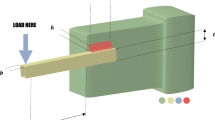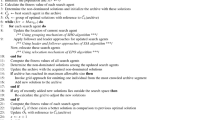Abstract
Due to the good balance between high efficiency and accuracy, meta-model based optimization algorithm is an important global optimization category and has been widely applied. To better solve the highly nonlinear and computation intensive engineering optimization problems, an enhanced hybrid and adaptive meta-model based global optimization (E-HAM) is first proposed in this work. Important region update method (IRU) and different sampling size strategies are proposed in the optimization method to enhance the performance. By applying self-moving and scaling strategy, the important region will be updated adaptively according to the search results to improve the resulting precision and convergence rate. Rough sampling strategy and intensive sampling strategy are applied at different stages of the optimization to improve the search efficiently and avoid results prematurely gathering in a small design space. The effectiveness of the new optimization algorithm is verified by comparing to six optimization methods with different variables bench mark optimization problems. The E-HAM optimization method is then applied to optimize the design parameters of the practical negative Poisson’s ratio (NPR) crash box in this work. The results indicate that the proposed E-HAM has high accuracy and efficiency in optimizing the computation intensive problems and can be widely used in engineering industry.
Similar content being viewed by others
References
Zhao W Z, Li Y J, Wang C Y, et al. Research on control strategy for differential steering system based on H8mixed sensitivity. Int J Automot Tech, 2013, 14: 913–919
Sun G, Fang J, Tian X, et al. Discrete robust optimization algorithm based on taguchi method for structural crashworthiness design. Expert Syst Appl, 2015, 42: 4482–4492
Yu X, Cao J, Shan H, et al. An adaptive hybrid algorithm based on particle swarm optimization and differential evolution for global optimization. Sci World J, 2014, 2: 1661–1667
Zhou G, Ma Z D, Cheng A G, et al. Design optimization of a runflat structure based on multi-objective genetic algorithm. Struct Multidiscip O, 2015, 51: 1363–1371
Simpson T W, Allen J K, Mistree F. Spatial correlation metamodels for global approximation in structural design optimization. In: ASME Design Engineering Technical Conference, Atlanta, 1998
Cresssie N. Spatial prediction and ordinary kriging. Math Geol, 1988, 20: 405–421
Beers W C M V, Kleijnen J P C. Kriging for interpolation in random simulation. General Inform, 2001, 54: 255–262
Zhao D, Xue D. A multi-surrogate approximation method for metamodeling. Eng Comput-Germany, 2011, 27: 139–153
Oman M, Nilsson L. Structural optimization of product families subjected to multiple crash load cases. Struct Multidiscip O, 2010, 41: 797–815
Box G E P, Wilson K B. On the Experimental Attainment of Optimum Conditions. New York: Springer, 1992. 270–310
Yang Q, Xue D. Comparative study on influencing factors in adaptive metamodeling. Eng Comput, 2014, 31: 561–577
White H, Stinchcombe M. Adaptive Efficient Weighted Least Squares With Dependent Observations. New York: Springer, 1991
Behera A K, Verbert J, Lauwers B, et al. Tool path compensation strategies for single point incremental sheet forming using multivariate adaptive regression splines. Comput Aided Design, 2013, 45: 575–590
Xu Y J, Zhang Q W, Zhang W H, et al. Optimization of injection molding process parameters to improve the mechanical performance of polymer product against impact. Int J Adv Manuf Tech, 2015, 76: 2199–2208
Couckuyt I, Deschrijver D, Dhaene T. Fast calculation of multiobjective probability of improvement and expected improvement criteria for pareto optimization. J Global Optim, 2014, 60: 575–594
Gu J C, Li G Y, Dong Z. Hybrid and adaptive meta-model-based global optimization. Eng Optimiz, 2012, 44: 87–104
Gu L, Yang J F. Construction of nearly orthogonal Latin hypercube designs. Metrika, 2013, 76: 819–830
Lee Y, Choi D H. Pointwise ensemble of meta-models using v nearest points cross-validation. Struct Multidiscip O, 2014, 50: 1–12
Tenne Y. An adaptive-topology ensemble algorithm for engineering optimization problems. Optimiz Eng, 2015, 16: 303–334
Hussein W A, Sahran S, Abdullah S N H S. A New Initialization Algorithm for Bees Algorithm. Soft Computing Applications and Intelligent Systems. Berlin Heidelberg: Springer, 2013
Xiong F, Greene S, Chen W, et al. A new sparse grid based method for uncertainty propagation. Struct Multidiscip O, 2010, 41: 335–349
Hua S U, Liang-Xian G U, Gong C L. Dynamic mode-pursuing sampling method for black-box function optimization problems. Comp Integ M Syst, 2013, 19: 1553–1558
Su G D, Dong X R. Simulation study on the factors affecting car’s front rail crashworthiness performance. Auto Tech, 2014, 4: 52–56
Zhang J, Ma M, Fan T, et al. Light weight replacement and the optimization design of bumper beam based on crash safety. Engineering, 2014, 12: 67–72
Author information
Authors and Affiliations
Corresponding author
Rights and permissions
About this article
Cite this article
Zhou, G., Duan, L., Zhao, W. et al. An enhanced hybrid and adaptive meta-model based global optimization algorithm for engineering optimization problems. Sci. China Technol. Sci. 59, 1147–1155 (2016). https://doi.org/10.1007/s11431-016-6068-4
Received:
Accepted:
Published:
Issue Date:
DOI: https://doi.org/10.1007/s11431-016-6068-4




